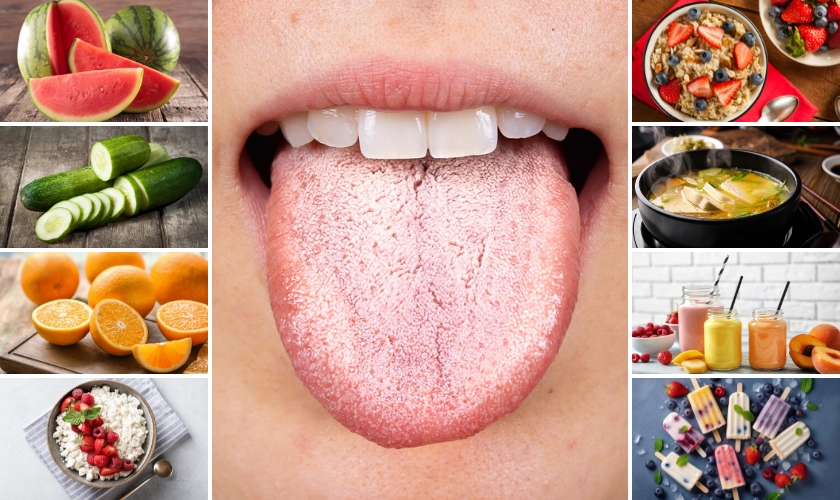704-844-2943
AVAILABLE FOR EMERGENCIES10 Best Foods to Eat When You Have Dry Mouth

Dry mouth, also known as xerostomia, occurs when your salivary glands don’t produce enough saliva to keep your mouth moist. This can lead to discomfort, difficulty swallowing, a higher risk of tooth decay, and other oral health issues. Managing dry mouth often involves staying hydrated, maintaining good oral hygiene, and making careful dietary choices. Here are 10 of the best foods to eat when you have a dry mouth.
1. Cucumbers
Cucumbers are incredibly hydrating due to their high water content, making them an excellent choice for those suffering from dry mouth. They can help stimulate saliva production and keep your mouth moist. Cucumbers are also low in acidity, reducing the risk of irritation.
2. Watermelon
Like cucumbers, watermelon is packed with water, which helps keep your mouth hydrated. Its natural sweetness can also be refreshing, and it’s easy to eat, making it a perfect snack for managing dry mouth symptoms.
3. Oranges
While many citrus fruits are acidic and can exacerbate dry mouth, oranges provide a balance of hydration and vitamin C without being overly harsh on your mouth. The juiciness of oranges can help stimulate saliva flow, but it’s best to consume them in moderation to avoid irritation from acidity.
4. Cottage Cheese
Cottage cheese is soft, easy to eat, and less likely to cause discomfort in a dry mouth. It’s also rich in calcium, which is beneficial for maintaining strong teeth. Pairing it with hydrating fruits like watermelon or cucumber can further enhance its benefits.
5. Oatmeal
Oatmeal is a gentle and nutritious option for those with dry mouth. Its soft texture makes it easy to swallow, and it can be prepared with added moisture to help combat dryness. Mixing in fruits like bananas or blueberries can boost their flavor and nutritional value.
6. Soups and Broths
Soups and broths are excellent for maintaining hydration while providing essential nutrients. Opt for clear broths or pureed soups, which are easier to swallow and less likely to cause discomfort. Avoid overly salty varieties, as they can further dry out your mouth.
7. Eggs
Eggs are a versatile and easy-to-eat protein source. Their soft texture makes them suitable for those with dry mouths, and they can be prepared in various ways, such as scrambled or poached, to suit individual preferences. Adding a little milk or cream while cooking can make them even more moist and palatable.
8. Smoothies
Smoothies are a fantastic way to combine multiple hydrating and nutritious ingredients in one meal. Blending fruits like berries, bananas, and spinach with yogurt or milk creates a refreshing, moisture-rich beverage that’s easy to consume. Adding ingredients like chia seeds or flaxseeds can boost the nutritional content without compromising hydration.
9. Avocados
Avocados are rich in healthy fats and have a creamy texture that’s easy to eat for those with dry mouth. They are also nutrient-dense, providing essential vitamins and minerals that support overall health. You can enjoy avocados on their own, in a smoothie, or mashed on toast for a tasty and hydrating option.
10. Popsicles
Popsicles, particularly those made from natural fruit juices or pureed fruits, can be both hydrating and soothing for a dry mouth. The cold temperature helps to numb any discomfort, while the natural fruit content provides hydration and a sweet treat. Be sure to choose popsicles with low sugar content to avoid potential tooth decay, a common concern for those with dry mouth.
Tips for Managing Dry Mouth
In addition to choosing the right foods, here are some extra tips to help manage dry mouth:
- Stay Hydrated: Drink plenty of water throughout the day to keep your mouth moist. Consider sipping water regularly rather than waiting until you feel thirsty.
- Chew Sugar-Free Gum: Chewing sugar-free gum or sucking on sugar-free candies can stimulate saliva production, helping to alleviate xerostomia symptoms.
- Avoid Caffeine and Alcohol: Both caffeine and alcohol can dehydrate your body and worsen xerostomia symptoms, so it’s best to limit or avoid them.
- Use a Humidifier: Keeping a humidifier in your bedroom can help maintain moisture in the air, reducing xerostomia symptoms, especially at night.
- Practice Good Oral Hygiene: Brush your teeth twice a day with fluoride toothpaste and floss daily. Regular dental check-ups are also essential for managing dry mouth.
Dry mouth can be managed effectively with the right dietary choices and proper oral care. Including the 10 foods mentioned above in your diet can greatly reduce symptoms. Hydration and good oral hygiene are also key components of managing xerostomia. If your symptoms persist or become severe, it’s important to consult your Matthews dentist, who can diagnose the underlying cause and recommend appropriate treatments. Beyond just drinking water, a balanced diet rich in hydrating foods is essential for maintaining oral comfort. By making mindful food choices, you can enjoy meals that are both delicious and beneficial for addressing dry mouth.
